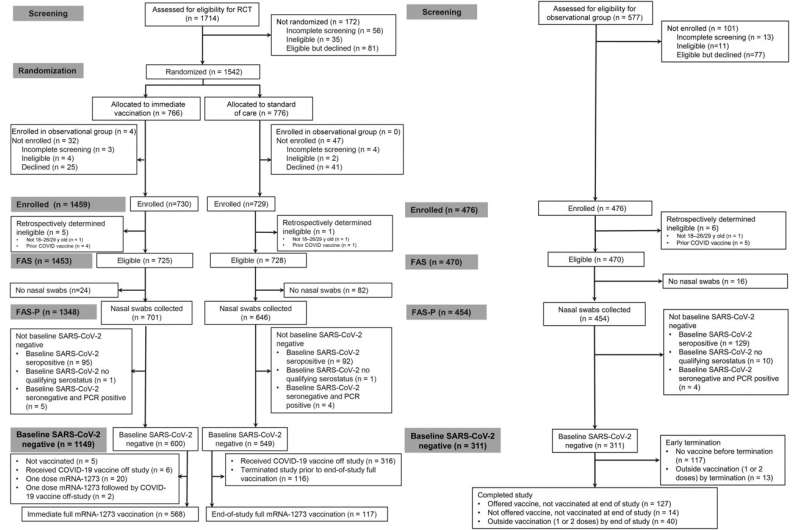This article has been reviewed according to Science X's editorial process and policies. Editors have highlighted the following attributes while ensuring the content's credibility:
fact-checked
trusted source
proofread
Study finds Moderna vaccine reduces symptomatic COVID-19 in young adults

The COVID-19 pandemic spurred the rapid development of different vaccines, including the messenger RNA (mRNA)-1273 vaccine produced by Moderna.
In a new study, a team of researchers including Rebecca Fischer, Ph.D., assistant professor in the Department of Epidemiology and Biostatistics at the Texas A&M University School of Public Health, analyzed the mRNA-1273 vaccine's efficacy at preventing infection and symptomatic COVID-19 in healthy young adults.
The study, published in the journal Open Forum Infectious Diseases, followed adults aged 18-29 with no known history of COVID-19 infection or prior vaccination for a six-month period to determine the effect of vaccination on the incidence of SARS-CoV-2 infection and on symptomatic COVID-19.
The research team recruited 1,149 young adults from 44 sites around the United States, mostly on college campuses, who were then randomly assigned to a group receiving immediate vaccination or one following the standard of care for vaccination. The researchers also included an observational group of participants who intended to decline COVID-19 vaccination altogether.
During the study period, participants were to collect nasal swab samples each day, which were then analyzed using quantitative PCR testing to detect COVID-19 infection. Infected individuals completed daily symptom diaries. Additionally, participants were surveyed about how often they followed recommendations like wearing masks indoors, maintaining physical distancing, and avoiding large gatherings.
Initial studies of the mRNA-1273 vaccine conducted earlier in the pandemic showed a 94.1 percent efficacy for preventing symptomatic COVID-19 over the first two months, with efficacy decreasing to around 93 percent up to six months after vaccination.
Later research found lower efficacy with the delta and omicron variants of COVID-19 at around 80 percent and 60 percent, respectively. However, these studies did not focus solely on young adults, who are often at risk of catching and spreading COVID-19. This study aimed to fill that gap and determine the efficacy of the mRNA-1273 vaccine in young adults.
"Importantly, a primary goal of this study was to assess the efficacy of the vaccine at preventing infection as well as illness since vaccines are generally evaluated on how effectively they prevent illness or severe disease," Fischer said.
The analysis found 93 cases of SARS-CoV-2 infection, including 11 participants who had received both vaccine doses, 13 who had received only their first dose, and 69 who were unvaccinated. Of the 93 infected individuals, 51 were considered to have symptomatic COVID-19, including four participants who had received both vaccine doses, four who had received a first dose, and 41 unvaccinated participants. No participants were hospitalized or required emergency room visits for COVID-19.
Ultimately, this study found that two doses of the mRNA-1273 vaccine had an efficacy of nearly 53 percent against infection and around 71 percent against symptomatic COVID-19.
"These efficacy rates were lower than other studies conducted around the same time, probably due to the uniquely rigorous testing design of this study, with an increased ability to detect even transient infections and differences in COVID-19 variants present at the time," Fischer said. "Notably, this study employed a randomized controlled trial, the gold standard of study designs for making such assessments, while many earlier studies were observational in nature."
In the vaccine-declined group alone, 45 infections occurred among the 311 participants, nearly double (1.8 times as many) the incidence observed in similarly unvaccinated participants in the standard-of-care group.
This result not only shows that unvaccinated young adults were more likely to contract infection but also highlights important behavioral differences in that group that could underlie increased infection risk, such as less frequent use of masking and physical distancing. The researchers also note that socioeconomic factors that increase the odds of exposure could be involved.
The research team noted a few limitations to their study. For example, the study had a short duration and was limited to healthy young adults, which limits the ability to generalize its findings to older or sicker populations. Additionally, recommendations for the standard of care cohort changed over the study period, such that about 58 percent of participants sought vaccinations later in the study, leading to some uncertainty in efficacy calculations for that group.
The study was also limited to a single vaccine and variants that were present during the study period. Further research will be needed to understand the efficacy of other vaccines better and later COVID-19 variants.
"Despite these limitations, the findings of this analysis indicate that vaccination reduced the incidence of COVID-19 infection and illness during the study period," Fischer said. "Additional research is needed on other vaccines and variants that also include other factors affecting infection risk. However, this study provides solid evidence for the value of vaccination in preventing COVID-19 in young adults."
More information: Kathryn E Stephenson et al, Efficacy of Messenger RNA–1273 Against Severe Acute Respiratory Syndrome Coronavirus 2 Acquisition in Young Adults From March to December 2021, Open Forum Infectious Diseases (2023). DOI: 10.1093/ofid/ofad511




















